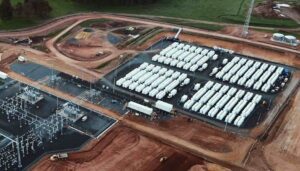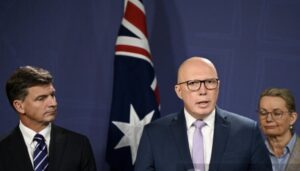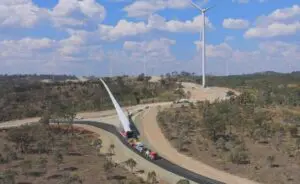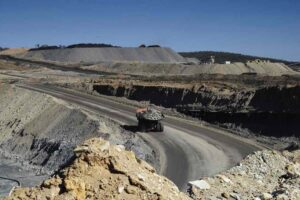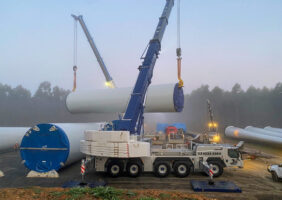Origin Energy – Australia’s biggest electricity retailer – has promised it will not fight against new technologies, and has vowed to “embrace” new products such as rooftop solar, batteries for storage and smart meters.
As part of a major pitch to both its shareholders and consumers that it is shifting its focus from fossil fuels to disruptive new technologies, Origin Energy says it intends to be a leader in both rooftop solar and utility-scale solar in Australia.
“The future will be marked by technology such as smart meters, solar panels and batteries for storage, and we will embrace this technology, not fight against it,” chairman Gordon Cairns told the company’s annual general meeting.
“We recognise the disruptive effect of solar on our market, and rather than ignore it, we are participating in it.
“We are committed to becoming a leading player in solar, and a leader in distributed energy and storage, responding to customer demand and community expectations.”
The company also re-iterated its plan to position itself to become a leading player in large scale solar, saying that the technology was likely to drive the “next boom in energy investment” in the country.
As part of its new positioning, Origin has signed up to become what it says is the first energy company in the world to adopt all seven ‘We Mean Business Coalition’ initiatives on climate change, which notably requires it to “follow the science” on climate change.
The comments from Cairns and King come at the end of a tumultuous 12 months when Origin’s share price has tanked and its huge commitment to the liquefied natural gas market questioned as the global oil price plunged.
In the view of analysts, Origin’s multi-billion dollar commitment to the LNG market has effectively made it in “oil play”, relying on rising oil prices for future revenues. And because the oil price has plunged, and shows no sign of recovery, it’s taken Origin’s share price down with it.
Origin is not the only victim. International hedge funds are losing billions on the oil market, not just on the commodity itself, but by placing big bets on cheap debt from oil companies hoping for a reversal in oil’s fortunes. That is not happening.
 But Origin remains committed to gas. It insists that its LNG operations can still be profitable, even at an oil price of $US23-25/barrel it will be “break-even”, although it needs an oil price of around $US40 to receive any distributions. Still, it says it remains convinced that gas will become “the fuel of choice” in the 21st Century, replacing coal.
But Origin remains committed to gas. It insists that its LNG operations can still be profitable, even at an oil price of $US23-25/barrel it will be “break-even”, although it needs an oil price of around $US40 to receive any distributions. Still, it says it remains convinced that gas will become “the fuel of choice” in the 21st Century, replacing coal.
Origin needs to believe that, because it has bet the future on that happening, even if the likes of the International Energy Agency admit that the “golden age of gas” – may be more a mirage than reality.
On the domestic front, Origin is facing headwinds of a different nature. The plunging cost of solar, and the emergence of battery storage, is posing a major threat to the business models of energy utilities, particularly generators and retailers, or the so-called “gentailers”.
Despite a recent slowdown in the deployment of rooftop solar, blamed mostly on the raising of fixed network charges and the payment of little or no money for exports to the grid, rooftop solar is expected to feature on the majority of household rooftops. A new survey suggests half of all homes will have rooftop solar and battery storage.
In both South Australia and Western Australia, authorities have predicted that day-time demand may be met entirely by rooftop solar within the next 10 years.
The exposure to these changing trends in domestic energy has caused Origin and its rivals to establish new business to focus on solar and storage, and to launch major marketing campaigns promoting their interest in solar.
This is also driving its commitment to climate change targets, and to observe the “450 scenario” that would see the global energy industry decarbonise in coming decades.
The marketing works. The main business daily, the AFR on Wednesday morning, trumpeted that Origin was going “100 per cent” renewables, saying that Grant King had gone “out of his way in recent years to position the company behind renewable energy.”
Er, that might not be everyone’s perception of King’s activities in recent years. While he has most certainly recognised the potential of renewables to be disruptive, Origin – like the other major utilities – has been a fierce opponent of the renewable energy target, and subsidies for renewable energy.
Indeed, it is only in the last 12 months that Origin has embraced solar and storage, rebuilding its capability in those technologies and launching new products on to the market. If it had been acting sooner, it might have secured more than 7 per cent of the solar market.
As for a commitment to 100 per cent renewables, this applies only to Origin’s corporate use, which is just a tiny fraction of its overall production. It does not apply to the electricity it sells its consumers, or indeed the huge amounts of gas it will export to Asia.
Origin has also pledged, as part of its commitment, to shut the Eraring power station in the mid 2030s. But, like AGL Energy’s promise to close its own coal-fired power stations, it is no more than what is expected to happen in the normal course of events. Neither company has committed to shutting down any coal power before the end of their licences.
However, Cairns said that the company supports Australia’s announced 2030 target – of a 26-28 per cent cut from 2005 levels – as a “minimum goal” and looks forward to “working with government and industry on meeting or exceeding that target.”
He also said that Origin supports Australia progressively de-carbonising its electricity mix with the aim of becoming “net carbon neutral” by 2050. A spokesperson later said that means “net carbon neutral” means “zero carbon emissions with offsets” i.e. Australia can’t get to zero carbon for electricity by 2050 so will have to put in place or buy offsets, such as trees, for the remaining emissions.
King said the fact that Origin buys around half of its electricity it sells to its consumers from the wholesale market – rather than generating it itself – means that it is well placed to benefit from the increased level of renewable energy and additional measures that will “inevitably be introduced” as Australia and the world seek to respond to the challenge of climate change.
“We have traditionally bought approximately 50 per cent of the energy we sell to our customers from other power generators and are therefore, what we call, ‘under-generated’,” he said.
“This will allow us to take up not only our share of renewable energy but to drive change in the way energy is generated in the future without stranding any of our current investment in generation.”
But the large scale renewable energy market is still waiting. Neither Origin nor its major rivals have agreed to sign power purchase agreements that would pave the way for more renewable energy generation to be built, despite the fact that renewable energy certificates have soared to record levels of $70/MWh.
A recent report by Green Energy Markets suggested that some 3,800MW of large scale renewable energy will need to be contracted by the end of 2016 if a shortfall in renewable energy certificates is to be avoided in 2017. A total of around 6,000MW of large scale solar or wind energy will be needed to meet the 2020 target.



